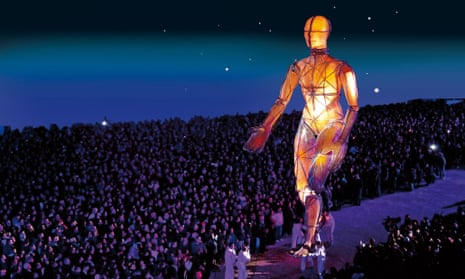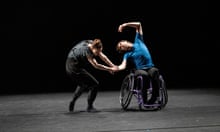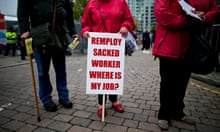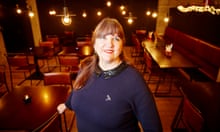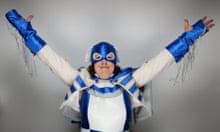You’d be forgiven for thinking that disabled artists had never had it so good. Unlimited – the commissioning and support programme for disabled artists, where I am senior producer – will on 26 March announce a £1.5m investment for its next round of commissions.
Then there’s the British Council, which has five works by disabled artists within the 30 chosen for its showcase at the Edinburgh fringe festival 2015. Graeae theatre company, the Dundee Rep and Derby Theatre have a mid-scale tour with an integrated production of Blood Wedding. Jess Thom from Touretteshero is giving the annual disability lecture at Cambridge University and her show Backstage in Biscuit Land is on at Brighton festival before a two-week run via Battersea Arts Centre.
What else? Production company Vital Xposure, which operates under the creative leadership of disabled artist Julie McNamara, recently touched down from a tour of Brazil, before heading straight to Canada to the Picture This Film Festival, where many films by UK disabled artists are shown. I’m just back from a conference in Qatar that focused on access and included the first exhibition of disabled artists at the prestigious Museum of Islamic Art. The list goes on…
All marvellous? Everything rosy?
Well, no. Let’s not forget what’s going on at a grassroots level.
In 2014, a survey by Scope found that two-thirds of the British public feel uncomfortable talking to disabled people, while more than a third think of disabled people as not as productive as everyone else. It also found that four in 10 disabled people have been denied a job because of an employer’s attitude to disability, and showed extensive evidence of widespread discrimination and hate crime against disabled people. This, remember, is after 2012 and the improvements in public perception following the Olympic and Paralympic Games.
Access to Work, the government-funded support service for disabled people in work, is being increasingly criticised for the ways in which it often seems to be limiting rather than offering support. Changes to the service, announced as recently as mid-March, are not exactly going to make things better, especially for deaf people, who are the hardest hit. Then there’s the Independent Living Fund, which looks as if it’s still going to close, no matter which political party wins in May. Doing so will severely limit the opportunities available to the disabled people currently supported at this level.
Is it any better in the arts? In the 2014 national portfolio organisation shake-up, Arts Council England (ACE) announced that the number of disabled-led organisations part of its portfolio was set to fall from 13 to nine (a fall of 30.8%) from April 2015. This means that disability-led organisations now make up a little over 1% of the portfolio with less than 0.5% of ACE funding as a whole.
That said, it’s not all doom and gloom. ACE is determined to shift its stats and approach. In December 2014, chair Sir Peter Bazalgette announced an additional £6m to support the creative case for diversity. It’s an approach that will see the creative potential of diversity and equality as an opportunity to enrich the arts for artists, audiences and wider society.
There are also lots of new initiatives out there pushing to make a difference. For young people trying to get into the arts sector there’s Shape Arts and its Inspiring Futures event: an open day for young disabled people on 24 April that focuses on progression routes into the creative industries, ranging from the visual arts to performance, theatre, music, film, museums and cultural management.
Even within the cultural sector, things are slowly getting serious about inclusion too. The London Theatres Consortium is engaged in a pilot project (thanks to funding from Unlimited) opening doors and getting artistic directors to talk directly with disabled actors, directors, writers and more to change what we see on our nation’s stages. Join the debate via the #Equalstages hasthag.
Scope responded to the startling statistics mentioned earlier by launching a campaign called End the awkward, which supports employers and the general public to face up to what might be awkward for them – to educate and inform them, and then simply ask them to get over themselves.
Last week, mac Birmingham and Dash held the Awkward Bastards symposium to take the concept of “awkward” even further, by challenging and exploring the concept of diversity.
One of the thornier issues raised at the event was about labelling: aren’t disabled artists just “artists”? Well, yes and no. All artists are artists – and in a perfect world, no one would need to take on a label just to gain funding, find a way in or get taken seriously. But that’s currently not the case and by identifying positively, it could be argued that disabled artists can gain a voice and a platform that can push them further, faster.
For some artists, it’s a matter of identity. If their work is informed directly or indirectly by their experiences as a disabled person, then it makes clear sense for them to identity as a disabled artist. Many disabled people see the word disability positively. I do, for one. Being a disabled person is part of the way I see myself in the world – as much a part of me as being a woman or any other label.
Perhaps it’s this identification that can be the shift that alters societal perceptions around disability – that stops us all being so awkward. If you know that the person who painted that image, starred in that play or composed that exquisite symphony was a disabled person, would it start to challenge your expectations of what disabled people can achieve? If you get to see disabled people equally and widely represented within our culture – popular, street and elite – that’s got to start shifting something.
Jo Verrent is senior producer at Unlimited
Get in touch if you have a story for our new disability arts series
Join our community of arts, culture and creative professionals by signing up free to the Guardian Culture Pros Network.
